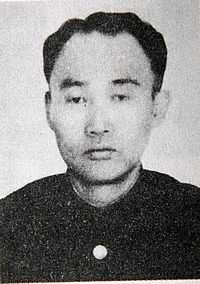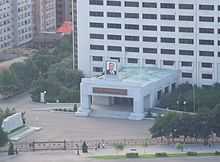Kim Chaek
| Kim Chaek | |
|---|---|
 Kim Chaek | |
| Native name | Hangul: 김책 or Hanja: 金策 |
| Born |
August 14, 1903 Sŏngjin, Haksong County |
| Died | July 1, 1951 (aged 48) |
Cause of death | an assassination after a power struggle, and caused by gas poisoning rather than a heart attack as officially claimed.[1] |
| Monuments | Songjin City was renamed to Kim Chaek City to commemorate his life.[2] |
| Nationality | Korean |
| Citizenship | North Korean |
| Occupation | North Korean general and politician |
| Awards | North Korea's National Reunification Prize |
Kim Chaek (Hangul: 김책, Hanja: 金策, 14 August 1903 – 31 January 1951) was a North Korean general and politician.
Born in Sŏngjin, Kim joined the guerrilla war against the Japanese occupation in 1927 and fought alongside Kim Il-sung in Manchuria. He joined the Korean People's Revolutionary Army in 1932. He defected to the Soviet Union to escape the Japanese conquest of the partisans in 1940. He lived in Khabarovsk where he met with Kim Il-Sung and formed the 88th Special Brigade. He returned to Korea along with the Soviet Army. He was appointed number 2 Committee Vice Chairman in the Korean Workers Party. Kim Chaek became industry minister and deputy prime minister under Kim Il-Sung in 1948. In the Korean War, he was commander of the North Korean troops on the front lines.
Kim was purged when he was found responsible for the failure at the Incheon Landing. He died in January 1951. Some believe that his death was an assassination after a power struggle, and caused by gas poisoning rather than a heart attack as officially claimed.[1]
Posthumous honours

After his death, Kim Chaek's birthplace Haksong County combined with the neighboring Songjin City was renamed to Kim Chaek City to commemorate his life.[2] The Kim Chaek University of Technology, Kim Chaek Iron and Steel Complex, and Kim Chaek People's Stadium[3] are also named after him. The stadium is located at 40°41'0"N 129°11'47"E.
He was posthumously awarded North Korea's National Reunification Prize in 1998.[4]
References
- ↑ 1.0 1.1 the North's Secret History by 林隠
- ↑ 2.0 2.1 http://www.rjkoehler.com/2004/09/15/kim-il-sungs-family-and-north-korean-place-names/
- ↑ http://wikimapia.org/11367142/Kim-Chaek-People-s-Stadium
- ↑ "National Reunification Prize Winners", Korean Central News Agency, 1998-05-07, retrieved 2012-09-13
- Korea, a century of change by Jürgen Kleiner page 275
- Korea Web Weekly Remembering Kim Chaik
- Kim Jong Il Biography. Pyongyang: Foreign Languages Publishing House for Literature, 2005.